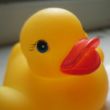
1个回答
2017-04-05 · 知道合伙人教育行家
关注
![]()

展开全部
陈述句变成否定句 一) 在其句中含有<Be>动词的陈述句,在《BE》动词后加上〈not>即可:
例如: 1) She was playing basketball at that time.
_ She was not playing basketball at that time.
2) We are having lunch at school .
_ We are not having lunch at school .
二) 在其句中含有情态动词的陈述句,在情态动词后加上〈not)即可:
例如: 1) They can speak English very well.
_ Thet can not speak English very well .
2) I can be a middle school student.
_ I can not be a middle school student .
三) 在其句中含有实义动词的陈述句,在主语后实义动词前加上(don't , doesn't , didn't)即 可;其中(don't 和 doesn't)主要用搭森山于一般现在时态,(didn't)只要用于一般过去时态。在使用(doesn't 和 didn't)时,要将相应的谓语动词还原成原形;
例如 :1) They love lishening to music .
_ They don't love lishening to music .
2) She gives me a book to read.
_ She doesn't give me a book to read.
3) My sister helped me learn French.
_ My sister didn't help me learn French .
以上三点仅知中用于一般现在时态和一般过去时态的陈述句。
陈述句变一般疑问句
一般疑问句分为be词提前和助动词
1 be词(am\is\are和他们的过去式were\was)提前
eg:1)He is a student!(他是一名学生)
Is he a student? (他是一名学生吗?)
2) We are students! (我们是学生)
Are you students? (你们是学生吗?)
3)I am a student!(我是一名学生!)
Are you students? (你是学生吗?)
2助动词(do\did have\had )
eg: 1) He eat an apple.(他吃苹果。)---eat为动词原形用do提问
Do he eat an apple?(他是苹果了吗?)
2)He ate an apple。(他吃了苹果)--ate为eat的过去分
是词春高用did提问同时动词ate恢复原形为eat
Did he eat apple?(他吃了苹果了吗?)
3)I have\had finished homework.(我完成了作业)
Have\had you finished homework?(你完成作业了没?)
3 can \ may \must 等情态动词
eg:1)we can\may\must do it .(我们能\可能\必须完成它)
Can\May\Must we must do it?(我们能\可能\必须完成它吗?)
例如: 1) She was playing basketball at that time.
_ She was not playing basketball at that time.
2) We are having lunch at school .
_ We are not having lunch at school .
二) 在其句中含有情态动词的陈述句,在情态动词后加上〈not)即可:
例如: 1) They can speak English very well.
_ Thet can not speak English very well .
2) I can be a middle school student.
_ I can not be a middle school student .
三) 在其句中含有实义动词的陈述句,在主语后实义动词前加上(don't , doesn't , didn't)即 可;其中(don't 和 doesn't)主要用搭森山于一般现在时态,(didn't)只要用于一般过去时态。在使用(doesn't 和 didn't)时,要将相应的谓语动词还原成原形;
例如 :1) They love lishening to music .
_ They don't love lishening to music .
2) She gives me a book to read.
_ She doesn't give me a book to read.
3) My sister helped me learn French.
_ My sister didn't help me learn French .
以上三点仅知中用于一般现在时态和一般过去时态的陈述句。
陈述句变一般疑问句
一般疑问句分为be词提前和助动词
1 be词(am\is\are和他们的过去式were\was)提前
eg:1)He is a student!(他是一名学生)
Is he a student? (他是一名学生吗?)
2) We are students! (我们是学生)
Are you students? (你们是学生吗?)
3)I am a student!(我是一名学生!)
Are you students? (你是学生吗?)
2助动词(do\did have\had )
eg: 1) He eat an apple.(他吃苹果。)---eat为动词原形用do提问
Do he eat an apple?(他是苹果了吗?)
2)He ate an apple。(他吃了苹果)--ate为eat的过去分
是词春高用did提问同时动词ate恢复原形为eat
Did he eat apple?(他吃了苹果了吗?)
3)I have\had finished homework.(我完成了作业)
Have\had you finished homework?(你完成作业了没?)
3 can \ may \must 等情态动词
eg:1)we can\may\must do it .(我们能\可能\必须完成它)
Can\May\Must we must do it?(我们能\可能\必须完成它吗?)
推荐律师服务:
若未解决您的问题,请您详细描述您的问题,通过百度律临进行免费专业咨询


